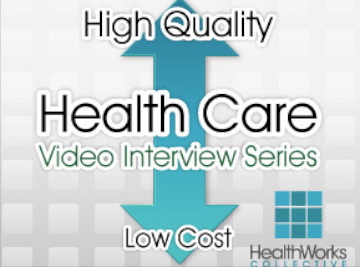

Previously, Kevin Palattao talked about HealthPartners and Virtuwell. Today, Gary Rost is here with me to talk about the Savannah Business Group and value-based purchasing. SBG is a business coalition that group purchases healthcare services for self-funded employers. They negotiate rates, services, and access with medical service providers on behalf of the members ot the coalition.
SBG is dedicated to maintaining high quality of care while reducing costs. Here is a shot of the main page on their website:

Compared to Kaiser Family Foundation’s reported national average of $415 per month, one of SBG’s largest members has monthly plan medical costs of just $217.
Gary Rost is the executive director of Savannah Business Group and has led the group for 20 years. I first read about SBG in a post by Brian Klepper and was interested in interviewing him for this series. Listen to what Gary has to say about Savannah Business Group and its vision for value-based healthcare.
To see other videos in this series, please go to this page. And if you have a story to tell that can reduce healthcare costs and raise quality of care, please comment below or email me at joan@socialmediatoday.com Thanks!
Video transcript (by transcriptionstar)
Joan: Hello. I’m Joan Justice with HealthWorks Collective. And I’m here today with Gary Rost, Executive Director of Savannah Business Group, which was really called one of the most effective healthcare coalitions in the country. On the company website, Savannah Business Group states that they’re dedicated to managing rising healthcare costs while maintaining a high level of quality care. They also state that one of their largest members has monthly plan, medical costs of only $217 compared this to the Kaiser Family Foundation’s reported average monthly cost of $415. That’s quite a difference. They must be doing something right. Gary, tell us what is Savannah Business Group doing right and helping other companies do the same?
Gary: Well, we approach the problem by addressing all the things that had to be addressed, and there’s four key things that an employer must address. One is the cost of the actual care. One is improving the quality and how that of the care that is provided. The third thing is making sure you have a plan design to support your negotiations in the work with the quality and the fourth thing is making sure that you’re working to improve the health of your community.
And we have taken the approach of doing value-based purchasing using a direct purchasing contract method, and we do all the value-based benefit design things that are recommended by all the big organizations throughout United States.
Joan: And so you were a collation you’re not an insurance company, correct?
Gary: That’s correct. We do not sell insurance. Each of our members are self-funded. They are their own insurance company.
Joan: Okay and how do your prices compare with Medicare prices?
Gary: We’re extremely competitive and when comes to that we’re at Medicare for a lot of our hospital services were about a 130 to 140% when it comes to physician services.
Joan: Okay and what about wellness programs and fitness programs. Do you help your — the companies in your organization develop those kinds of programs for their employees and how important do you think that is? I guess it’s pretty important.
Gary: It is extremely important, and from the very beginning, and the really age we’ve been encouraging our employers to make sure they have a wellness program. We started with the Heart Association Program, and now we’ve moved to diabetes and obesity soaking sensation [Phonetic] [0:02:47] anything that reduces the risk of expensive care, also we need to teach patients how to take care of themselves and control their own diseases to minimize emergency room and hospitalization services.
We’ll see an increase in some services, but with those be offset by the really high cost things that, that you want to avoid.
Joan: Okay and how successful are these programs the most –?
Gary: Extremely.
Joan: Really good.
Gary: The City of Savannah which is one of our key employers is actually on a negative trend line for their healthcare costs for the last five years because of very aggressive diabetes and weight program that they had in place. They’ve been enable to move their trend line 16% in the last four years.
Joan: That’s wonderful.
Gary: So it’s really it hasn’t in here.
Joan: Yeah, that’s wonderful. What did you think of the Brill article in Time magazine?
Gary: Well, I finally read it. And I think that problem is much more complex than just the hospitals I think he was a little unfair to the hospitals. The Chargemasters are the way they are because they have to have them that way to deal with the insurance companies. There’s a huge problem also with physicians. Some of the studies say that at least one-third of the healthcare cost are total waste, and we know that about a $1000 a year its just to help offset cost of the uninsured so I think the article although would — it did point out some things. It’s just one part of a very complex picture.
Joan: Agreed. And just what do you think is the biggest obstacle to lowering healthcare cost in your opinion?
Gary: Well, healthcare is still a for-profit business. Our employers and the self-funded employers they’re not in it for the money. They’re just trying breakeven and offer a benefit. Insurance companies still make a lot of money. And the doctors in hospitals you know they need money to expand and grow their services, but then there’s also how much is a reasonable profit. I think as long as it’s a for-profit business we’re still going to have problems with healthcare costs.
Joan: Great. Well, Gary thank you so much for your words and wisdom. Obviously, SPG is doing a great job under your leadership and I think others can learn from your successes. Thanks so much.
Gary: You’re welcome. Thank you very much.









